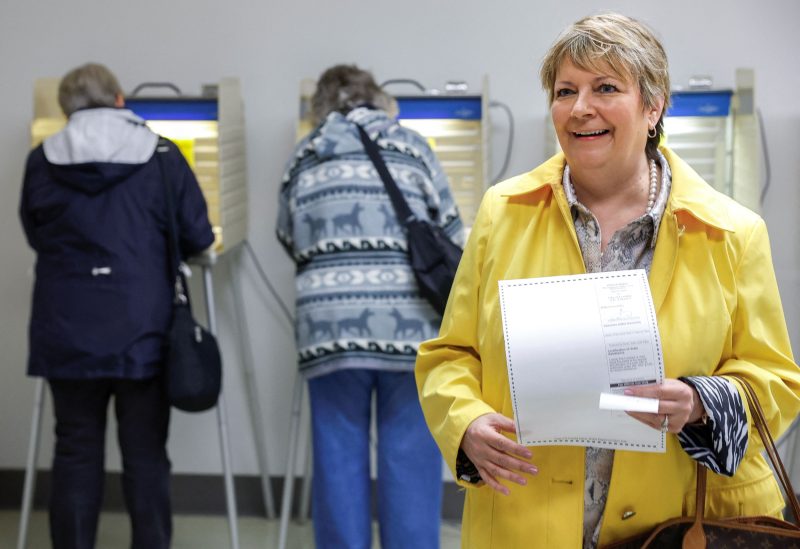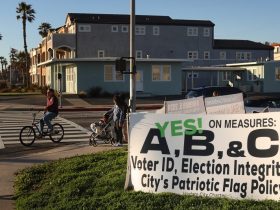MADISON, Wis. — In what’s widely viewed as the most significant election of 2023, Wisconsin voters on Tuesday will decide whether liberals or conservatives control the state Supreme Court just as it gears up to consider a challenge to the state’s abortion ban.
The court in the coming years could also consider the state’s gerrymandered legislative districts and what election rules should be in place for the 2024 presidential election.
The candidates, political parties and independent groups spent more than $40 million on the race, making it by far the most expensive judicial contest in U.S. history. The race more than quadrupled the amount spent in Wisconsin’s 2020 state Supreme Court race.
Seeking a seat on the court are Janet Protasiewicz, a Milwaukee County judge backed by Democrats, and Daniel Kelly, a former state Supreme Court justice campaigning with the help of Republicans.
Relatively large numbers of voters are expected to go to the polls in an off-cycle election that typically sees turnout of less than 30 percent of eligible voters. Before the polls opened Tuesday, about 435,000 voters had cast early ballots. That’s the equivalent of more than a third of the 1.2 million votes cast in the 2019 state Supreme Court race, the last time such a position led a ballot. Nearly 1 million voters cast ballots in the February primary, almost twice as many who voted in the February 2018 primary for a seat on the state Supreme Court.
Conservatives have held the court since 2008, but their 4-3 majority is now up for grabs because conservative Justice Patience Roggensack decided not to seek another term. Over the past 15 years, conservatives on the court issued rulings that upheld limits on unions, approved a voter ID law, ended a campaign finance investigation of Republicans, outlawed absentee ballot drop boxes and adopted election maps that assured Republicans have commanding majorities in the state legislature.
The election is happening as a Manhattan court prepares to unseal an indictment against former president Donald Trump, but it is unclear whether that development will influence Wisconsin voters in any way. Trump endorsed Kelly in 2020 but stayed out of this year’s race.
Judicial candidates in Wisconsin do not run with party labels, but the race is steeped in partisanship. The state Democratic Party gave nearly $9 million to Protasiewicz, while arms of the Republican Party gave more than $500,000 to Kelly, and GOP megadonor Richard Uihlein spent nearly $6 million to help him, according to campaign finance records. Many others joined in the political spending spree as well, destroying a record set for a court race nearly 20 years ago in Illinois.
While spending between the two sides in the Wisconsin race was relatively close, liberals ran about three times as many ads as conservatives in the final weeks of the campaign, according to the media-tracking firm AdImpact. That’s because Democrats took advantage of a campaign finance law written by Republican lawmakers in 2015 that let them funnel huge sums to Protasiewicz, who qualified for the cheapest ad rates because she was a candidate for office. Conservatives ran most of their ads through independent groups that pay far more for ads.
Kelly joined the court in 2016, when the Republican governor at the time, Scott Walker, appointed him to fill a vacancy. He lost the seat by 10 points in 2020 but hoped to rejoin it this year.
Protasiewicz had the advantage in the race from the start. She got in early, raised $14 million over the next year and a half and got Democrats to coalesce around her even though another liberal was also running. She came in first in the February primary with 47 percent. Kelly was second with 24 percent, edging out conservative Waukesha County Judge Jennifer Dorow by two points. (The other liberal in the race, Dane County Judge Everett Mitchell, received about 8 percent.)
Protasiewicz made abortion rights the centerpiece of her campaign. Democrats have found the issue resonates with voters since the U.S. Supreme Court in June overturned Roe v. Wade, the 1973 ruling that guaranteed access to abortion across the nation.
Kelly has criticized Protasiewicz for expressing her support for access to abortion, saying she can’t be impartial on the issue. He made his opposition to abortion clear in blog posts he wrote before he was on the court but has said he has been careful not to talk about his views since he was appointed to the bench.
When the U.S. Supreme Court struck down Roe, abortion providers in Wisconsin stopped offering the procedure because of an 1849 law that bans abortion unless one is required to save the life of the mother. A trial judge is slated to hear a challenge to the law next month, and the case is expected to eventually reach the state Supreme Court.
Over the next two years, the state high court could be called on to decide a host of voting rules for the 2024 presidential election. And the justices could be dragged into challenges over the results of that election, as they were in 2020. Last time, conservative Justice Brian Hagedorn joined the court’s liberals to issue a string of 4-3 rulings that rejected challenges from Trump and his allies over Joe Biden’s win in the state.
Protasiewicz has praised the court for upholding the 2020 results but expressed alarm that three justices dissented from it. Kelly has repeatedly criticized Hagedorn for other rulings but in an interview said he saw no reason to question the majority rulings in the cases about the 2020 results.








